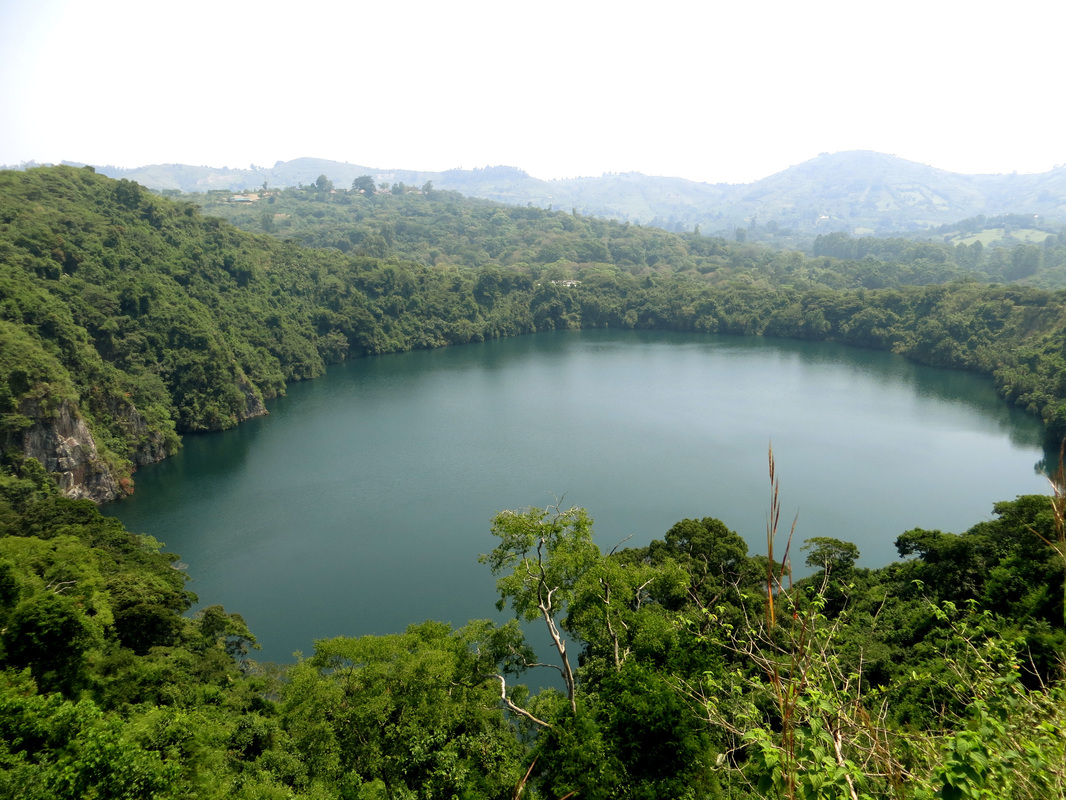Crater Lakes Fort PortalThe landscape south of Fort Portal is dotted with picturesque crater lakes, some over 400m deep. These crater lakes are breathtakingly beautiful to behold, and offer one of the best hiking places in the area. The hikes lead you through several crater lakes, villages, tea plantations and waterfalls. To match the beauty of the crater lakes, one can sometimes also see the tallest African Mountain range, the Rwenzori Mountains of the Moon in the distance on a clear sunny day.
The crater lakes were formed rather recently, a mere 8,000-10,000 years ago. Though they are serene, scenic lakes today, they were caused by violent volcanic activity, exploding ash and rock far and wide. It is interesting to note that fire and brimstone still erupted from these explosions as recently as 2,000 BC while the Pyramids in Egypt were being built. Today however, these volcanoes lie dormant, leaving great places for swimming, viewpoints and nature trails, that one can hike surrounded by monkeys, tropical birds, and magnificent sights. |
About Uganda |
Uganda is one of the 54 independent countries on the African continent. It is located in East Africa and belongs to a cooperation agreement with its neighbors as part of an official East African Community together with Kenya, Tanzania, Rwanda and Burundi.
East Africa is very diverse and composed of many tribes and ethnic groups that traditionally had their own social, political and economic structures. National boundaries did not exist until European countries colonized Africa and began dividing it up among themselves. Uganda became a protectorate of the UK meaning it was under their rule and political system but with a very small British presence actually in the country. Colonialism quickly began to replace traditional beliefs with colonial ideologies of democracy, global trade and religion. This was not without tension as the colonialists met strong systems of rule already in place, the Buganda Monarchy being one of the strongest. Uganda became a formal independent country on 9th October 1962. After independence from the UK, Uganda suffered a long history of violence, unrest and corruption. However, in recent decades, Uganda has enjoyed consistent economic growth and has experienced long periods of peace and stability that continues today although Uganda still is one of the poorest nations in the world. |
About Fort Portal |
Fort Portal is a town in the Western Region of Uganda, approximately 320 kilometres by road west of Kampala, Uganda's capital and largest city. Fort Portal is located near Kibale Forest National Park (the best place to track and see chimps), and Queen Elizabeth National Park (Uganda's most-visited National Park and home to over 95 mammal species and over 600 bird species).
Fort Portal is the heart of the tea-growing area and an important commercial centre. It's pleasant cool climate and central location make it a very convenient base from which to explore the area, so many people end up staying here for a few days. The area offers sublime scenery, abundant nature and genuine adventure. Main attractions include craterlakes, chimp trekking in Kibale National Park, and Semuliki National Park with its hot springs and central African wildlife. |

